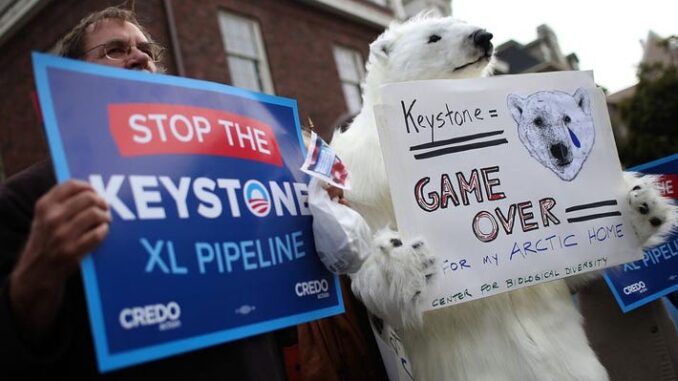
Cognitive dissonance is rearing its ugly head as the many politicians who agitated against fossil fuels investment, production and consumption now complain about high prices. Sadly, this is not new as energy policies are often contradictory, sometimes for rational reasons but other times apparently due to inattention or sloppy thinking. Most commonly, every U.S. government has wished for lower oil and gas prices, but often taken steps that had the opposite effect.
Some policies were simply illogical or counterproductive in their design. Blocking the Keystone XL pipeline supposedly for environmental reasons meant that the oil would travel by rail, which had higher economic costs and environmental impact. But earlier examples abound, including the decision to prevent export of Alaskan crude oil since expediting the pipeline construction was considered crucial to America’s energy security. Blocking exports was more of a sop to pipeline opponents than a contribution to energy security, and the only result was to raise producers’ costs and thus reduce investment, production and jobs, as well as tax payments to the government. (All else being equal.)
Strangely, there have been numerous instances where governments were willing to pay more for imported energy than for domestic supplies. In the 1970s, the U.K. paid its gas producers a fraction of the price they offered for imported supplies until the Iron Lady, Margaret Thatcher, stopped the practice, creating a boom in investment and gas production, to the country’s benefit.
In the U.S., natural gas was subject to federal price controls for three decades. In the 1970s, the solution to the regulatory—created shortages was to offer as much as ten times for imported natural gas as for ‘old’ natural gas supplies in the U.S. This lowered domestic production and meant consumers paid higher prices, while maintaining the fiction that there were no windfall profits. In fact, it only meant foreign producers received them.
Numerous foreign policy moves have also resulted in higher oil and energy prices, especially various economic sanctions imposed on governments in Iran, Iraq, Libya and Venezuela. Yet all of those sanctions were imposed by U.S. governments that wanted lower oil prices, but felt the political needs outweighed the economic damage. Conversely, the U.S. has arguably sometimes bent its foreign policy to protect its oil supplies—or supplies to the global economy—by befriending otherwise disreputable leaders such as the Shah of Iran.
Some of these inconsistent policies stem from competing interests. The Jones Act restricts shipping between U.S. ports to American-flagged ships, a blatant giveaway to the International Seaman’s Union at the expense of consumers. Massachusetts has thus imported Russian LNG instead of supplies from the Gulf Coast. Similarly, mandates for ethanol blending in gasoline are allegedly done for both energy security and environmental benefits, but the reality is that the primary result has been higher income for farmers, by bolstering corn demand and prices, while raising costs for consumers.
As mentioned, blocking the Keystone XL pipeline was claimed to be aimed at environmental goals, but probably worsened emissions. Similarly, allowing wind turbines exceptions to restrictions on the killing of endangered or protected species, basically birds and bats, sacrifices one environmental goal for another. Habitat loss for biofuels production probably does more harm than the supposed environmental benefits.
Trade policy that incentivizes domestic production of components for renewable energy and electric vehicles makes them more expensive, reducing their contribution (real or otherwise) to stated energy and environmental goals. Similarly, the current pronouncement insistence that energy policy should create not just jobs but union jobs will have the same effect, typically raising costs and reducing renewable energy output.
But sometimes policies are simply internally inconsistent. This was most obvious when President Nixon, while implementing price controls on oil, argued for the necessity of achieving energy independence. Price controls meant more consumption and less domestic production, increasing oil imports and energy dependence, something that no few pointed out then and since.
James Schlesinger, the first U.S. Secretary of Energy, raised a few eyebrows when he told the Saudis that the world needed more of their oil, while claiming that oil in the ground was worth more than money in the bank, effectively asking them to lose money by granting his wish. Unsurprising to those with long memories, he was wrong on that score but hardly alone in his belief.
And certainly an egregious case of inconsistency, if not hypocrisy, can be seen in the complaints that oil companies are not investing enough, while the Administration has taken explicit steps to discourage oil drilling, including a pause on leasing in federal lands and threats of higher taxes. And the Biden Administration asking Saudi Arabia for more oil supply while withholding exploration leases in the U.S. is reminiscent of Nixon’s simultaneous use of price controls on oil while trumpeting plans for energy independence.
Now, some are proposing a new ban on oil exports to help consumers, which would have a similar effect to Nixon’s price controls. It would lower domestic prices, at least initially, but thus reduce upstream investment and domestic production, increasing oil imports and ultimately make the world oil market tighter. Preventing U.S. LNG exports would similarly lower domestic prices but at the cost of hurting our allies who need natural gas. Lower prices for oil and gas would mean less drilling, fewer jobs (oil field service jobs pay far more than solar panel installation ones), and less government revenue.
Further, while methane emissions are a concern and need to be reduce, the combination of a possible ban on natural gas flaring and restrictions on pipeline construction could mean less drilling for oil that has associated gas—such as in the Permian and Eagle Ford. This would also boost prices, domestically and internationally.
Ultimately, the basic problem is the inability of policy-makers to consider two elements at a time, specifically, costs AND benefits. Those writing the Jones Act or the ethanol mandate think only of the benefits to their constituents, not of the costs to the wider public. Price controls or an export ban made seem to have positive results, but if the costs are considered, the net impact is negative—to the apparent unconcern of advocates.
The late Vito Stagliano detailed the incoherence of energy policy making in his 2001 book A Policy of Our Discontent, which described politicians ignoring energy policy—and experts—until a crisis hit, and then ignoring only the experts. Typically, they seek to satisfy the public by appearing to do something, regardless of its being economically irrational. Posturing and virtue signaling in energy and environmental policy-making remain all too common, with the public ultimately bearing the price.






